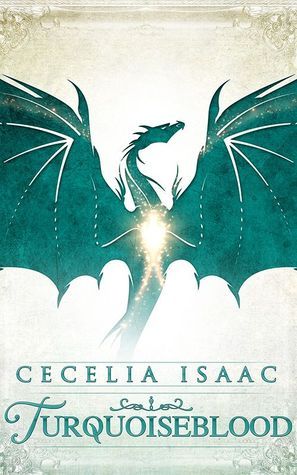Book Review:
Turquoiseblood
Cecilia Isaac
First Edition Design Publishing, 2016
A
The Basics:
When Kiri, a young woman from a backwoods mountain village, saves the life of Anya, a dragon suffering a fit of Turquoiseblood madness, the two embark on a quest to get to the bottom of what happened to her. The mystery runs deeper than either of them knows, leading them from the outlying villages, to the castle ruins of the once powerful League, to the heart of the royal court.
Long ago but not far away, Pristina Aikaterine, daughter of the League, tries to root out a traitor and quash the growing unrest over the League’s magic monopoly, unwittingly leaving the breadcrumbs Kiri and Anya will need in order to untangle the subterfuge of their own political era.
The Downside:
Apart from the usual Fantasy difficulties of keeping track of all the names (Tarik and Terricker are two important and completely unrelated characters, for example), the biggest drawbacks are a few hanging threads of untapped potential. The challenge Pristina faces in her timeline is essentially an energy crisis, and it’s thrillingly unclear whether she’s even on the right side of it, but that uncertainty leaves room for so much more exploration than we ever get. In fact, The villain monologues of both timelines are unnecessarily and unfortunately packed with metaphoric mustache-twirling, considering how nuanced and understandable the villains’ motivations otherwise are. There’s also some Fantasy trope-rebelling discussion of the meaninglessness of bloodlines, yet blood does end up tying Kiri to her end of the story, which is otherwise a bit impersonal for a hero’s plotline, driven mainly by curiosity.
The Upside:
The mystery at the center of the forestory is delightfully twisty, casting suspicion one way and then the next with sparse but satisfyingly sprinkled clues. Rather than a cookie-cutter plot, or a simple inversion of that plot that could be guessed by any savvy genre fan, there’s room for viable hypothesizing all over the place, and nobody is safe or above reproach.
Isaac pulls some other wonderful tricks along the way as well. More than once you’ll catch yourself flipping back to realize that no gendered pronoun was ever attached to that doctor or guard character in the background. It’s a shock to recognize how easy it is to make assumptions while reading, almost as much as it’s a relief to find yourself reading a book that, for once, doesn’t reinforce those assumptions.
No attention is ever drawn to it, but the story is full of such rejections of expectation, from the core of the plot to the smallest cosmetic details. Noble ladies have happy, healthy sex lives. Fathers support their daughters. Princesses rule while princes cloister themselves in delicate grief. Heroines charge into danger and take care of business while husbands nag and worry but never get in the way. Men and women both make terrible decisions in the throes of love, without requiring the deliberate manipulation of devilish fatales.
Every stitch in the fabric of Turquoiseblood quietly but insistently questions why the beaten path for female characters need exist, especially in, of all places, worlds of magic where dragons rule the skies.
Agree? Disagree? Comments are always welcome (just keep it civil, folks)!
Want more Fiona J.R. Titchenell? Become a patron to gain access to exclusive extras. Or keep up with my fictional musings by joining me on Facebook, Pinterest, Twitter, or signing up for email updates in the panel on the right!







